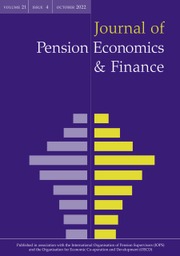No CrossRef data available.
Article contents
Does pension information impact savings?
Published online by Cambridge University Press: 03 March 2022
Abstract
Many pension reforms in OECD countries included pension statements with the objective of improving individuals' financial security in retirement. Our objective is to assess the effectiveness of the pension information policy implemented in France and to investigate whether the pension statement results in better informed workers, who then increase their retirement savings. Using regression discontinuity designs combined with quantile regressions, we assess whether the changes in retirement savings and holding of assets are due to the pension information system and then quantify the impact. We conclude that a pension estimate sent to workers encourages the wealthiest to increase their retirement savings while it does not influence the savings of individuals with a low level of wealth.
- Type
- Article
- Information
- Copyright
- Copyright © The Author(s), 2022. Published by Cambridge University Press




